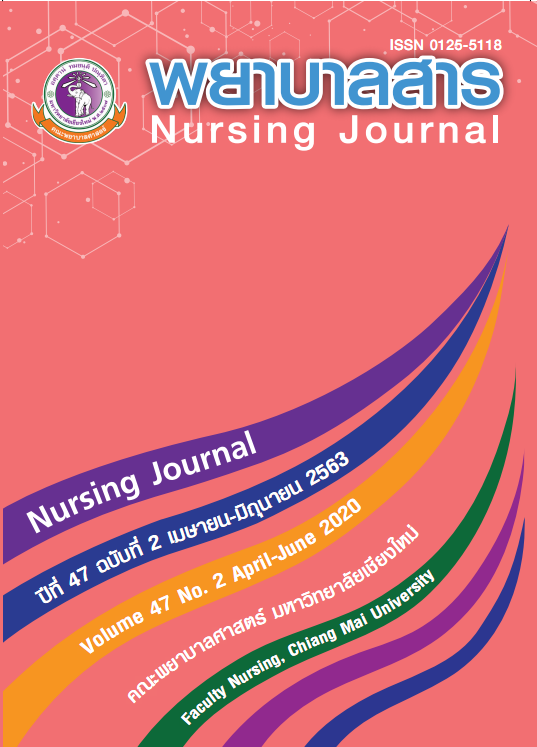Health Literacy and Self-Management in Older Persons with Type 2 Diabetes Mellitus
Keywords:
health literacy, self-management, older persons with type 2 diabetes mellitusAbstract
Diabetes is a chronic disease that needs self-management to control the symptoms of the disease. Health literacy is an important factor affecting self-management. This correlation descriptive research aimed to investigate health literacy, self-management, and the relationship between health literacy and self-management among older persons with type 2 diabetes mellitus. Participants were the older persons with type 2 diabetes mellitus who visited a non-communicable diseases clinic at Phothale Hospital, Phichit Province. The 88 participants were selected using convenience sampling from November to December 2016. The research tools used in this study were a demographic data recording forms, health literacy and self-management behaviors questionnaires. Data were analyzed using descriptive statistics and Pearson’s Correlation Coefficient
The results showed that the health literacy and self-management were at a high level. Health Literacy had a positive relationship with self-management at a moderate level with statistical significance (r = 0.54 , p < .01).
The results from this study demonstrate the direct benefits for health care professionals in promoting health literacy and self-management among older persons with type 2 diabetes mellitus.
References
Al Sayah, F., Majumdar, S. R., Williams, B., Robertson, S., & Johnson, J. A. (2013). Health literacy and health outcomes in diabetes: a systematic review. Journal of General Internal Medicine, 28 (3), 444-452.
Angboonta, P. (2011). Effects of a Self-management Supporting Program on Self-managem ent Behaviors and Hemoglobin A1C Level Among Elders with Diabetes Type 2 (Master’s thesis, Chiangmai University). (In Thai)
Bohanny, W., Wu, S. F. V., Liu, C. Y., Yeh, S. H., Tsay, S. L., & Wang, T. J. (2013). Health literacy, self efficacy, and self care behaviors in patients with type 2 diabetes mellitus. Journal of the American Association of Nurse Practitioners, 25 (9), 495-502.
Bureau of Elderly Health, Health Promotion Center, Department o f Health, Ministry of Public Health. (2013). Health Status of the elderly Program 2013 Under the health promotion plan for the elderly and disables. Bangkok: Printing Watcharin PP. (In Thai)
Burns, N., & Grove, S. K. (2009). The practice of nursing research conduct, critique, & Utilization.(5th ed.). Philadelphia: Elsevier.
Division of Non Communicable Disease, Department of Disease Con trol, Ministry of Public Health. (2016). Annual report 2016. Retrieved from http://www.thaincd.com/document/file/download/paper-manual. (In Thai)
Ghafoor, E., Riaz, M., Eichorst, B., Fawwad, A., & Basit, A. (2015). Evaluation of diabetes conversation map education tools for diabetes self-management education. Diabetes Spectrum, 28(4), 230-235. doi:10.2337/diaspect.28.4.230
Heijmans, M., Waverijn, G., Rademakers, J., van der Vaart, R., & Rijken, M. (2015). Functional, communicative and critical health literacy of chronic disease p atients and their importance for self-management. Patient Education and Counseling, 98 (1), 41-48.
Huang, M., Zhao, R., Li, S., & Jiang, X. (2014). Self-management behavior in patients with type 2Diabetes a cross-Sectional Survey in Western Urban China, PLoS ONE, 9 (4).
Ishikawa, H., Takeuchi, T., & Yano, E. (2008). Measuring functional, communicative, and criticalhealth literacy among diabetic patients. Diabetes Care, 31(5), 874-879.
Kaissi, A. A., & Parchman, M. (2009). Organizational factors associated with self-management behaviors in diabetes primary care clinics. The Diabetes Educator, 35(5), 843-850.
Kim, K. S., Kim, S. K., Sung, K. M., Cho, Y. W., & Park, S. W. (2012). Management of type 2 diabetes mellitus in older adults. Diabetes & metabolism journal, 36 (5), 336-344.
Lorig, K. R., & Holman, H. R. (2003). Self-management education, history, definition, outcomes, and mechanisms. Annals of Behavioral Medicine, 26(1), 1-7.
Montoya, M. F. (2015). The Association between Health Literacy and Diabetes Outcomes and Self-Management Behaviors among Older Adults in the US (Doctoral dissertation, University of North Texas Health Science Center).
Nutbeam, D. (2000). Health literacy as a public health goal: a challenge for contemporary health education and communication strategies into the 21st century. Health Promotion International, 15(3), 259-267.
Ownby, R. L., Waldrop-Valverde, D., & Taha, J. (2012). Why is health literacy related to health? An exploration among US National Assessment of Adult Literacy p articipants 40 years of age and older. Educational Gerontology, 38 (11), 776-787.
Phetarvut, S., Watthayu, N., P., & Suwonnaroop, N. (2011). Factors Predicting Diabetes Selfmanagement behavior among Patients with Diabetes Mellitus Type 2. Nursing Science Journal of Thailand, 29(4), 18-26. (In Thai)
Qin, L., & Xu, H. (2016). A cross-sectional study of the effect of health literacy on diabetesprevention and control among elderly individuals with prediabet es in rural China. BMJ Open, 6(5). doi:10.1136/bmjopen-2016-011077
Smith, K. H., Nolan, M. E., & Knehans, A. M. Y. (2014). Aging and health literacy. Journal of Consumer Health on the Internet, 18(1), 94-100.
Speros, C. I. (2009). More than words: promoting health literacy in older adults. OJIN: The Online Journal of Issues in Nursing, 14 (3).
Downloads
Published
How to Cite
Issue
Section
License
บทความที่ได้รับการตีพิมพ์เป็นลิขสิทธิ์ของวารสารพยาบาลสาร
ข้อความที่ปรากฏในบทความแต่ละเรื่องในวารสารวิชาการเล่มนี้เป็นความคิดเห็นส่วนตัวของผู้เขียนแต่ละท่านไม่เกี่ยวข้องกับมหาวิทยาลัยเชียงใหม่ และคณาจารย์ท่านอื่นๆในมหาวิทยาลัยฯ แต่อย่างใด ความรับผิดชอบองค์ประกอบทั้งหมดของบทความแต่ละเรื่องเป็นของผู้เขียนแต่ละท่าน หากมีความผิดพลาดใด ๆ ผู้เขียนแต่ละท่านจะรับผิดชอบบทความของตนเองแต่ผู้เดียว






